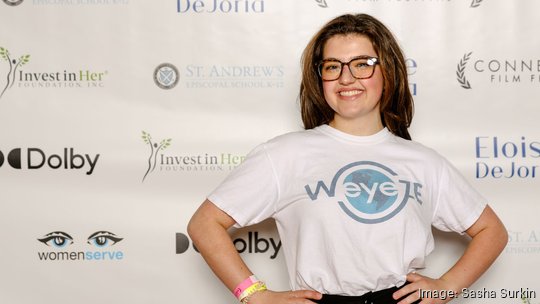
By day, Greenville native Sasha Surkin is an honors student at UNC-Chapel Hill. But in her free time she’s the CEO of a company trying to make optometry more accessible with a glasses kit that creates personalized corrective lenses – without having to wait for an eye appointment.
At 20 years old, she’s won multiple grants and made big plans – all for the startup, WeyeZE, founded out of squinting in her sixth grade classroom.
Surkin was raised with what she describes as an “exploratory mindset.” She and her three sisters were brought up in a household with National Geographic magazines on the coffee table and documentaries on the television, knowing early on that “knowledge was such a privilege to have and ideas were like gold.”
She went to a Chinese immersion school, where vision is particularly important, as one small stroke can change the entire meaning of a character.
So, in sixth grade when she found herself having to move closer to the board to read the writing, it was a big deal. But the process for getting glasses wasn’t exactly efficient – even though she had her parents’ insurance. It took two months to get an optometry appointment, two weeks for the Costco glasses. But when she returned to the classroom with a pair, the improvement was huge.
When she was 14, she read a New York Times article that had her reflecting even more on that experience – on how the lack of vision care impacted more than 1 billion people and caused a $250 billion deficit in global productivity.
At a routine visit to the optometrist, she found herself even more interested in the machines they were using – and wondering if she could create a glasses kit with lenses that go on top of one another in order to mimic what you would see from a typical pair of glasses.
In 10th grade, while dually enrolled at the North Carolina School of Science and Mathematics and Stanford University Online High School, she decided to go all in on her idea. She obtained her first grant, NCSSM’s $550, and started prototyping. When Covid happened a year later and she was back at home, she decided to concentrate on optics for her physics requirement. She started winning pitch competitions – validation that “the product worked.”
After high school, she enrolled at UNC on a full scholarship, and doubled down on her efforts even further, winning a $1,000 prize for a film she created on how she started the business. She won a $10,000 NC IDEA Micro Grant, and is on track to take the idea further.
While some of her UNC colleagues were perfecting their Thanksgiving recipes, Surkin was completing her first round of beta testing in near sighted and far sighted consumers – comparing their actual prescription measurements to the end product from the kits she’s developing – 85 percent of participants had the same prescription power, she said.
Soon, she hopes to pilot the kits to a large audience, likely a school.
The goal is to provide the kits – both direct to consumer and to government and community organizations. Surkin said studying in Alaska showed her one use-case. Rural villages have health aids – not optometrists, meaning the kits could be a change-maker. But Surkin said she’s open to the possibilities of where the idea might take her.
“I don’t know where I’m going to be after I graduate,” she said. “I hope that it’s in the area because my family lives in north Carolina and they’re very important to me but if there’s something for WeyeZE that I think would help it flourish like the Bay Area or New York or Austin, then I will take it there to help it grow, but ultimately I do want to stay in North Carolina.”
Thom Ruhe, president and CEO of the NC Idea Foundation, is among those impressed by Surkin. He said her company stood out with its addressable market – serving a “global need with significant market potential and social impact.”
“As is frequently the case with founders, Sasha has identified an industry stuck in an outdated modality that under-serves their client’s needs," he said.